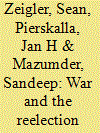| Srl | Item |
| 1 |
ID:
121118


|
|
|
|
|
| Publication |
2013.
|
| Summary/Abstract |
The spread of cell phone technology across Africa has transforming effects on the economic and political sphere of the continent. In this paper, we investigate the impact of cell phone technology on violent collective action. We contend that the availability of cell phones as a communication technology allows political groups to overcome collective action problems more easily and improve in-group cooperation, and coordination. Utilizing novel, spatially disaggregated data on cell phone coverage and the location of organized violent events in Africa, we are able to show that the availability of cell phone coverage significantly and substantially increases the probability of violent conflict. Our findings hold across numerous different model specifications and robustness checks, including cross-sectional models, instrumental variable techniques, and panel data methods.
|
|
|
|
|
|
|
|
|
|
|
|
|
|
|
|
| 2 |
ID:
132323


|
|
|
|
|
| Publication |
2014.
|
| Summary/Abstract |
This article investigates the relationship between term limits and international conflict. Theories of political survival and diversionary war both imply term limits should play a role in international relations, whereas "permanent referendum theory," largely motivated by work in American politics, suggests otherwise. Drawing on these theories, we formulate and test competing hypotheses regarding term limits and international crises. Using dyadic militarized interstate disputes data and information on forty-eight democracies with term limits, we uncover strong evidence to support the claim that leaders reaching final terms in office are more likely to initiate conflict than those still subject to reelection. Moreover, we find that the likelihood of conflict initiation is significantly higher during times of recession, but only in the absence of binding term limits. While binding electoral terms and economic downturns are both independently associated with increased levels of conflict initiation, in concert their conditional effects actually counteract each other.
|
|
|
|
|
|
|
|
|
|
|
|
|
|
|
|